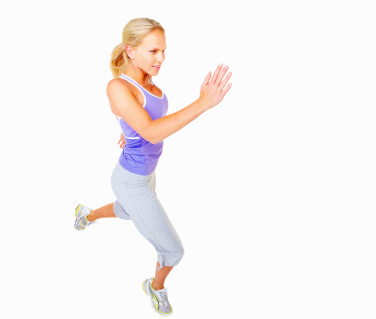Walking vs Running - What is Better for You?
Advantages and Disadvantages Explored and Explained!
Walking vs running. Which one is better? What is more beneficial?
There is some controversy about whether or not running is more beneficial than walking.
And you might be wondering? What is better? Especially if you want to get in shape.
Or you want to lose weight with exercise.
There are plenty of misconceptions out there. Let's talk about them one by one and clear this up!
Walking vs Running - Weight Loss

But without the heavy impact on the joints ankles, and shins that running brings.
And I would say that's a fair first assessment. Running has a higher risk of injury than running. But... you burn approximately as many calories when you run a mile or walk a mile.
However, running a mile will, of course, go faster than walking it.
So, running is a lot more efficient. And of course, covering only one mile is not helping you burn that many calories. You'll have to build this up to two, three miles and beyond.
Check out the calories burned calculator to work out how many calories you burn in your running or walking workouts.
So, if you are walking and aiming for weight loss, then you do need to make sure you have got sufficient time available. Now, I don't want to discourage you from walking. Not at all.
However, the potential benefits of walking, especially when it comes to weight loss efforts, are very often overstated. That's not because they don't exist at all. It just takes a lot of time out of your schedule. More time than most of us have.
Having said that, if running is not possible for you, then, by all means, walk. Walking is a great way to start running, as we discuss later. And, if you do have sufficient time available, it will work.
Surely, by now we have all heard about the 10,000 steps per day. Track it on your fitness watch or go old school and use a pedometer... doing 10,000 steps per day delivers a reasonable level of activity and fitness.
Try to be consistent with it and if 10,000 steps does not deliver you your weight loss goals then up the ante and go for 12,000 or 15,000 steps per day.
And lastly, if we want to achieve weight loss, we also want to think about our diet. Check out the running and weight loss page to get some thoughts on diet.
Walking vs Running - Health Benefits of Walking and Running

Walking and running provide many health benefits. Just doing some running or brisk walks for a few miles at a time calms, clears, and helps to focus the mind. It helps to reduce stress. Cover enough distance and you will see some weight loss.
Running has the additional benefit that it boosts your heart rate a bit more. It provides a better boost to your cardiovascular system (heart and blood vessels) and respiratory system (lungs).
Which in turn, has been linked to improved mental health benefits.
Whatever you do, running or walking, both help you maintain a more active lifestyle, avoiding the many ill effects of the sedentary lifestyle. Study after study proves it again and again, movement is an absolute key to better health and greater longevity.
Walking vs Running - Injury Considerations

Walking is also great exercise for you when you haven't exactly kept up with your working out or exercising through the years. It is a very safe form of exercise.
When you go walking, even walking briskly, you don't have nearly the injury risk that you do if you start running again.
Some of us spend a decade or more on the couch to then start off an ambitious running program after a wake-up call. And if we are not careful, it leads to an injury. We run too fast, too far. If "too much too soon"-itis was a running injury, many runners would be diagnosed with it... !
Running puts extra stress on the lower back and legs predominantly.
Running also puts extra stress on the knees, ankles and bones and tendons of the feet and lower legs. Many people who first get into running experience shin splints or other overuse injuries. Shin splints are an annoying pain in the shins brought on by the impacts of running.
Runners are more injury-prone. About 80% of us suffer some kind of injury any given year. That's a lot. It's got a lot to do with stubbornness. Continuing to run, even when you have some pain. Sticking to your program, even when you know you need to take a day off.
But still, the statistic is there. When you run, chances are fairly high that you may experience injuries along the way.
When you walk, even when you walk rapidly, you just aren't going to experience the impact, the forces on your body that you may get from running.
This is not to say that running is unsafe. But you need to learn to take it easy as you start off with running, build up slowly and listen to your body, taking rest as needed.
Running vs Walking - So What To Do?

Pretty much every governments provides health guidelines.
They often state that you need to do thirty minutes of vigorous exercise five times a week.
This type of exercise commitment makes an incredible difference to your health, fitness and weight, not to mention the mental benefits.
Just check out the benefits of running page for a more complete list of benefits.
Running thirty minutes per workout is what helps get that heart rate up to a level where real cardiovascular strengthening happens.
This is what makes the legs and your whole body stronger.
This level of exercise per week gives you a fair chance to experience weight loss.
But... we just said that running is not as safe as walking. And yes, especially if you haven't been much of an active person for quite some time there is a risk you will be pushing for too much, too soon.
However, what you can do is go for a walk-run mix. This is taking the best of both types of exercise. The running provides that boost to your heart and your metabolism, the walking helps to reap the benefits of exercise and helps provide a safe base.
Instead of pushing the envelope too much, choose a combination of walking and running when you are starting out. A few examples of run/walk programs are the beginner running programs on this site.
Even if you have been inactive all your life, the beginner running programs provide you with a solution to start running. When doing run/walks you slowly increase the time spent running and reduce the time spent running.
This provides you with some of the weight loss, physical health and mental health benefits of running. But the build-up is slow and steady, reducing your risk of injury.

Before you know it, you'll be able to do this. I know, because hundreds of people have done these running programs.
They are free, so just try them out and see if they work for you. I know they will!
In the end, the debate of walking vs running may continue and continue.
Much of it ignores that you don't have to make a choice, necessarily.
You can reap the benefits of both walking and running by doing a run/walk program!
Home > Beginner Running Tips > Walking vs Running






